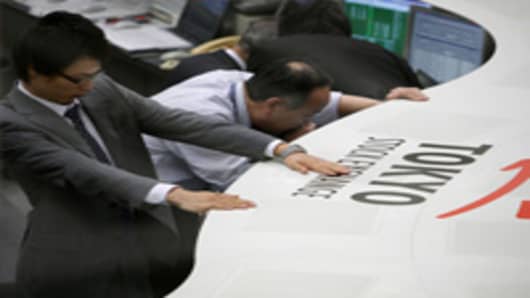But Kawai Music and Mitsui Mining & Smelting outperformed the broader market. Their shares gained 6 percent and 2.7 percent respectively, after the two companies estimated that their full-year profits would beat forecasts.
Seoul shares lost 2.2 percent on record foreign selling, with banks like KB Financial leading the declines as they tracked their U.S. peers lower.
Shares in KB Financial, the holding firm of South Korea's top commercial lender Kookmin Bank, were down 5.0 percent and Hana Financial lost 5.5 percent.
Key tech and auto blue-chips were also hit hard, with shares in Samsung Electronics, the world's top memory chip maker, shedding 2.46 percent and Hyundai Motor, South Korea's top automaker, losing 4.0 percent.
The Korea Composite Stock Price Index (KOSPI) closed at 1,647.50 points.
Australia Down 2%
Australian shares bounced from steep early losses on Friday to close 2 percent lower as bargain-hunters swooped into battered mining stocks after sharp falls this week on the back of a proposed new profits tax.
Still, after five straight sessions of losses, Australian shares have lost 6.8 percent this week, the worst week since November 2008 at the height of the global financial crisis.
Shares fell more than 3 percent in early trade to touch an eight-month low, amid a global flight from risky assets as investors panicked about a spread of Greece's sovereign debt woes to other euro zone nations.
A report that the Group of Seven nations would discuss market turmoil in a conference call on Friday also helped sentiment.
The benchmark S&P/ASX 200 index slipped 92.55 points to 4,480.70, the fifth straight day of declines. It touched a low of 4,427.3, its lowest since September last year.
New Zealand's benchmark NZX 50 index fell 1.8 percent to 3,158.8.
Top global miners, which had been battered this week because of the new mining-profits tax, lost some more ground but outperformed the wider market. BHP Billiton fell 0.3 percent and Rio Tinto lost 1.1 percent.
The mining-heavy materials index lost 6.9 percent this week, its sharpest weekly fall in just over a year.
Consumer discretionary stocks also regained ground in afternoon trade, including electronics retailer JB Hi-Fi which reaffirmed its profit guidance. It rose 1.1 percent.
Dealers said the Reserve Bank's policy statement had little impact, having been overtaken by turmoil in global markets that might force a rethink on future rate hikes. The RBA raised its forecasts for economic growth and inflation.
The major banks ended down around 2.5-5 percent, led by National Australia Bank down 4.95 percent at A$24.68.
Gold miners advanced after gold neared a record high amid the flight to safety, with Newcrest Mining advancing 1.5 percent to A$31.49
Greater China Markets Pare Losses
China's key stock index declined 1.9 percent to a fresh eight-month closing low and posted its worst week of the year, taking its cues from weak overseas markets battered by worries about the Greek debt crisis and possible contagion in Europe.
The Shanghai Composite Index ended the day at 2,688.4 points, marking a 6.3 percent loss for the week.
Natural resource companies, particularly coal producers, were the biggest fallers. Analysts said they had a stronger connection to the global economy than many other sectors. Pingdingshan Tianan Coal Mining fell 8.7 percent.
Banks and property companies slightly outperformed the wider index with analysts saying investors may be ready to look for bargains after the recent hefty declines.
Merchants Bank, one of the day's 10 most actively traded stocks, was up 0.4 percent, while Shanghai's property subindex fell 1.3 percent to a fresh 13-month low, extending Thursday's 5.2 percent slump.
Hong Kong's Hang Seng Index traded 1.1 percent lower, with market heavyweights HSBC and Standard Chartered down 5.0 percent and 5.8 percent respectively.
Shares of skincare products retailer L'Occitane International, the first French company listing in Hong Kong, fell about 8 percent on their $708 million Hong Kong trading debut on Friday.
L'Occitane, which sells body care products and fragrances, fell as low as HK$13.80 in early trade, compared with a Hong Kong IPO price of HK$15.08, which is the top of its indicated range.
Singapore's STI declined 1.1 percent while Malaysia's KLCI shed 0.5 percent.
DBS lost 1.6 percent in the bearish trading session. Southeast Asia's largest bank had posted stronger-than-expected first quarter earnings due to lower bad debt charges and higher fees.


